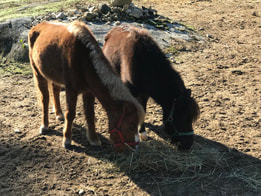Terminology in the Equestrian Arena ~
GSA currently Offers EAA , Adaptive Riding and Para-Equestrian Coaching
Equine Assisted Activities:
Participants supported by educators & coaches rotate through stations of:
Equine Experiential Learning
Grooming
Mounted Riding
Horsemanship
Life Skills Enhancement
(Ages 3 and up)
Wellness and stress management programs also offered in partnership with mental health practitioners
Participants supported by educators & coaches rotate through stations of:
Equine Experiential Learning
Grooming
Mounted Riding
Horsemanship
Life Skills Enhancement
(Ages 3 and up)
Wellness and stress management programs also offered in partnership with mental health practitioners
Adaptive Riding:
Use of adaptive riding methods and tack to reach the highest level of
independent horsemanship. There are overall health benefits and wellness
with the goal of mastering skills in a nurturing environment. (Ages 5-adult)
Use of adaptive riding methods and tack to reach the highest level of
independent horsemanship. There are overall health benefits and wellness
with the goal of mastering skills in a nurturing environment. (Ages 5-adult)
Para-Equestrian Coaching:
Paralympic eligible riders independent of side-walkers and
leaders will be coached in the beginning levels of dressage.
Paralympic eligible riders independent of side-walkers and
leaders will be coached in the beginning levels of dressage.
Hippotherapy:
Treatment strategy by PT,OT and SLP Professionals using the movement
of the horse to engage the sensorimotor system to create functional change
in a client as part of an integrated plan of care
Treatment strategy by PT,OT and SLP Professionals using the movement
of the horse to engage the sensorimotor system to create functional change
in a client as part of an integrated plan of care
Our Equine Professionals:
Jennifer Fraser BS, PT, CTRI
PATH International Certified Therapeutic Riding Instructor
AHA Level One & Two Hippotherapy Specialist Trained
Marlee Fraser Walker BSW, CTRI
PATH International Certified Therapeutic Riding Instructor
USOC Certificate Pilot Program Para- Dressage Coach
Monica Huang Wu MS, OTR/L, HPCS, CTRI
PATH International Certified/ Registered Therapeutic Riding Instructor, MA Certified Riding Instructor
Christine Leach BS, CTRI, ESMHL
PATH International Certified Therapeutic Riding Instructor
PATH International Equine Specialist in Mental Health and Learning
Courtney Esty DPT
Tyler Santucci MS,OTR/L
Eliza Lucas
Equine Handler
Jennifer Fraser BS, PT, CTRI
PATH International Certified Therapeutic Riding Instructor
AHA Level One & Two Hippotherapy Specialist Trained
Marlee Fraser Walker BSW, CTRI
PATH International Certified Therapeutic Riding Instructor
USOC Certificate Pilot Program Para- Dressage Coach
Monica Huang Wu MS, OTR/L, HPCS, CTRI
PATH International Certified/ Registered Therapeutic Riding Instructor, MA Certified Riding Instructor
Christine Leach BS, CTRI, ESMHL
PATH International Certified Therapeutic Riding Instructor
PATH International Equine Specialist in Mental Health and Learning
Courtney Esty DPT
Tyler Santucci MS,OTR/L
Eliza Lucas
Equine Handler
THE MOVEMENT OF THE HORSE
The gait of a horse is repetitive, rhythmical, symmetrical and three-dimensional.
This movement can provide numerous benefits to the rider such as:
Mobility to pelvis and spine
Improvement in posture and muscle tone
Improve balance and coordination
Strength and flexibility
Facilitation of speech and language
THE RELATIONSHIP BETWEEN HORSE AND RIDER
The human-animal bond, non-verbal communication and success oriented activities
promote emotional and cognitive benefits such as:
Improved self-esteem
Increased attention span
Increased motivation
Increased self-confidence
Enriched experience in sport and recreation
The human-animal bond, non-verbal communication and success oriented activities
promote emotional and cognitive benefits such as:
Improved self-esteem
Increased attention span
Increased motivation
Increased self-confidence
Enriched experience in sport and recreation
Meet the Horses!
In Memory Nuryev Trakehner (15'1'') Duke - Welsh x Shetland pony (12') Lucy - Quarter Horse (15'3'')

